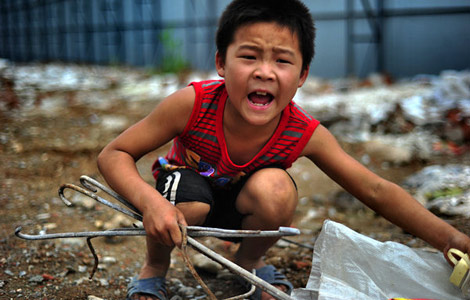Domestic abuse law on horizon
Updated: 2011-09-08 07:12
By Zheng Jinran and Cao Yin (China Daily)
|
|||||||||
BEIJING - Legislators are in the final stages of designing a new law to tackle the scourge of domestic violence, a leading women's rights campaigner said on Wednesday.
"It's time to move forward," said Liu Bohong, deputy director of the Women's Studies Institute of China. "The proposed law will make a huge difference in protecting human rights, especially for the victims of domestic violence."
Despite the progress, she said she is still unable to predict when the law will actually be passed.
Although in the pipeline for years, news that the proposed law is nearing comes at a time when domestic abuse is back on the agenda, due to allegations against Li Yang, founder of Crazy English.
A netizen called Li Na Hua's Mother who claims to be Li's wife, Kim Lee, accused the businessman of beating her in a post on Sina Weibo, a leading micro-blogging website. Attached were pictures of a Caucasian woman with bruises to her face.
The post alleged that Li sat on his wife's back and slammed her head against the floor.
"Seeing that you were having makeup applied for a TV appearance while I was in hospital hurts more than you slamming my head on the floor," read a post published on Saturday.
"You must recognize this behavior is not mentally sound. I must divorce you for the sake of our girls," read another message on Monday.
Private messages sent to Li Na Hua's Mother by China Daily reporters on Sina have so far gone unanswered.
A spokesman for Li also declined to comment, adding only that a statement will be released in the future.
The allegations have helped turn the spotlight once again onto domestic violence, a problem that experts at the All-China Women's Federation say is "universal".
A recent survey by the group found that about 80 million Chinese families have been affected by domestic abuse, with roughly 90 percent of cases involving a woman being beaten by a man.
A woman from Hunan province who spoke on condition of anonymity said she divorced her husband after he beat her several times. "I forgave him the first few times. After all, he was my husband, my family. But it became harsher and I couldn't bear it," she said.
Many countries have set up laws to prevent all forms of violence against women, including domestic abuse. In China, many regulations have been issued to punish perpetrators, but they are scattered through different laws, said Liu at the Women's Studies Institute.
"To better protect women's rights, we need a dedicated law," she added.
Chen Wei, a Beijing-based attorney specializing in marriage cases, said the most difficult thing for victims is proving their physical and mental injuries.
Even if violent partners are punished, they are often only given short-term detention or ordered to pay compensation, which does little to solve the problem, she said.
Liu agreed and urged legislators to include heavier punishments in the new law. It should also clarify the responsibilities for all relevant departments, she added, such as what police stations and courts should do to bring an end to violence in the home.











